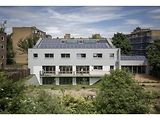Although the Mildmay Community Centre are the main drivers in this initiative, our initial point of contact with members of the community was through the membership of Citizens without Borders, a community-based organisation with over 200 active members in London whose aim is to engage in civic action using different approaches to explore the surrounding environment and to expand publicly owned social and environmental knowledge. Their contribution in identifying community needs for web-based learning and sharing of findings as well as the identification of the pro and cons, benefits and threats of using grassroots science was an invaluable starting point that confirmed the importance of the Science has no Borders initiative.
At the MCC we have engaged with community leaders both through meeting with them in person at several of their events and in particular through their community garden project, which aims at eventually providing fruits and vegetables for the local area. Community leader, Jenny Littlewood, who runs the garden initiative, has been very keen to start mini DIY environmental monitoring projects for their garden such as measuring humidity and temperature changes, water quality testing, gas sensing to measure CO2 exchange, and infra-red photography to monitor plant health.
Looking to gain more community-expert advice on community-led garden projects we contacted Chris Church, London-based environmental activist and community organiser with Green Alliance. He has given us good advice other community groups in the vicinity of the MCC who are very active with their community gardens. We have also sought advice on garden environmental monitoring from Annemie Maes, a multimedia artist and activist, who has been developing a project called Connected Open Greens - collective rooftop city gardens - in which regenerative energy technologies meet traditional gardening and art. UCL lecturer Robert Biel, who has initiatives on urban agriculture and community food in the south of London, in Brixton, has also shared some of his knowledge on involving vulnerable communities in community gardening projects.
The selection and development of the specific DIY tools for the MCC community garden is based on community input with guidance from PLOTS. The recent DIY book "Environmental Monitoring with Arduino" has also provided useful guidance in a manner that reflects the community-led approach of our initiative.
Justin Bere, the main architect in charge of the MCC retrofit - turning the community centre’s building into a passive and energy efficient model (making use of natural lighting, insulation, solar, etc.), has also been a keen supporter of the DIY initiatives community-led research.
[Photo from: http://www.bere.co.uk/projects/mayville-community-centre-passivhaus-retrofit]

0 Comments
Login to comment.